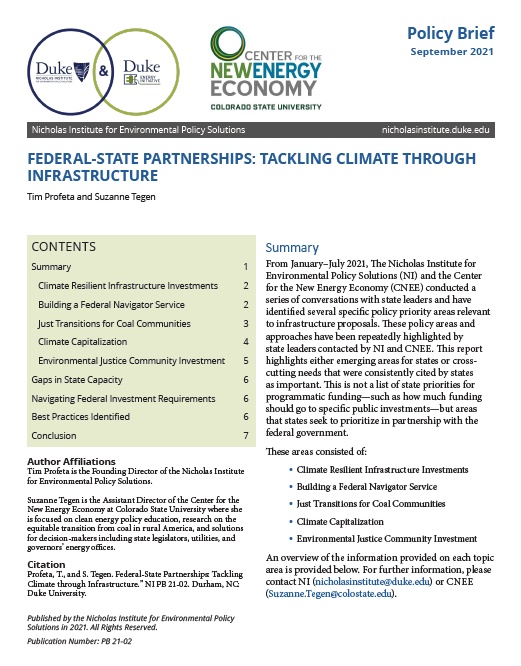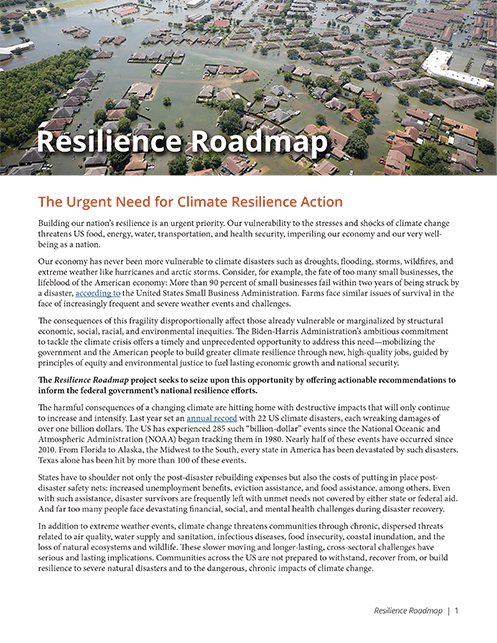Publications
Utilities Need Regulatory Certainty
The Nicholas Institute's Tim Profeta contributed an essay to "How to Advance Environmental Protection During a Turbulent Era," a special section in the March/April issue of Environmental Forum. The Trump administration is expected to take up a deregulatory agenda—which environmentalists anticipate with trepidation but which businesses generally welcome as an appropriate relaxation of regulations they say inhibit a creative free market and stymie investments in needed projects.
Rethinking Load Growth: Assessing the Potential for Integration of Large Flexible Loads in US Power Systems
A key solution to the United States' soaring electrical demand—driven by unprecedented electricity needs from large commercial customers, particularly data centers and their booming artificial intelligence workloads—is load flexibility. This analysis provides a first-order estimate of the potential for accommodating such loads with minimal capacity expansion or impact on demand-supply balance.
Planning for Growing Electricity Demand During an Era of Uncertain Renewables and Climate Policy
Electricity demand growth has accelerated significantly, a trend that is expected to continue for at least the next 5 to 10 years and is driven by new technologies such as data centers and the expansion of the manufacturing and industrial base in the United States. This analysis uses a variety of integrated resource plans from utilities and other groups to estimate how overall electricity demand may change over the next decade in several scenarios.
Unlocking Clean Energy Projects Using Tax Chaining: A Primer
This paper provides a high-level overview of chaining, an emerging concept that marries two highly consequential provisions of the tax code established by the passage of the 2022 Inflation Reduction Act (IRA): Transferability of tax credits and direct (also known as elective) pay to nonprofit or public entities in lieu of tax credits.
Besides unlocking additional capital, chaining could reduce the cost of capital, ease cash flow, and allow for different parties to share risk. The US Department of the Treasury is actively accepting comments on chaining until December 1, 2024. Through those comments, Treasury is seeking to ascertain, in part, how much more capital chaining can enable and how chaining would be executed.
Projecting Electricity-Sector Investments Under the Inflation Reduction Act: New Cost Assumptions and Interactions with EPA’s Greenhouse Gas Proposal
Energy Pathways USA, an initiative of the Nicholas Institute for Energy, Environment & Sustainability at Duke University, has released a report that offers new insights into US energy transition investments. This report comprehensively models the intersecting effects of the Inflation Reduction Act, clean electricity development cost increases, and the impacts of proposed US Environmental Protection Agency greenhouse gas regulations for fossil fuels.
Federal-State Partnerships: Tackling Climate through Infrastructure
This report by the Nicholas Institute and the Center for the New Energy Economy highlights several specific policy priority areas relevant to infrastructure proposals in regards to climate issues.
Resilience Roadmap: The Urgent Need for Climate Resilience Action
Building our nation’s resilience is an urgent priority. Our vulnerability to the stresses and shocks of climate change threatens US food, energy, water, transportation, and health security, imperiling our economy and our very well-being as a nation. The Resilience Roadmap project seeks to offer actionable recommendations to inform the federal government’s national resilience efforts.
Climate Change Is Here, but Who Is Paying for It?
State and local governments have advanced their own initiatives on climate change when faced with a failure of federal leadership. This analysis looks at the challenge of costs to states in mitigating and developing resiliency to climate change.
Federal Grants to States: Opportunities for Climate Change Assessment, Planning, Programs, and Information Exchange
The lessons we learn from the mobilization in response to the COVID disaster should be applied as we prepare for another disaster that is putting increasing demands on state and federal resources: climate change. With states and the federal government all having essential roles to fulfill in the response to national disasters, an effective federal-state partnership should be at the heart of a nationwide climate strategy.
Testimony Before the Subcommittee on Environment & Climate Change of the U.S. House Committee on Energy & Commerce
Nicholas Institute Executive Director Tim Profeta testifies before the Subcommittee on Environment & Climate Change of the U.S. House Committee on Energy & Commerce to suggest the best means by which to achieve economy-wide solutions to climate change. The central point of his testimony is that Congress should strongly consider a model that has been successfully proven through our nation’s history: the federal/state partnership.










